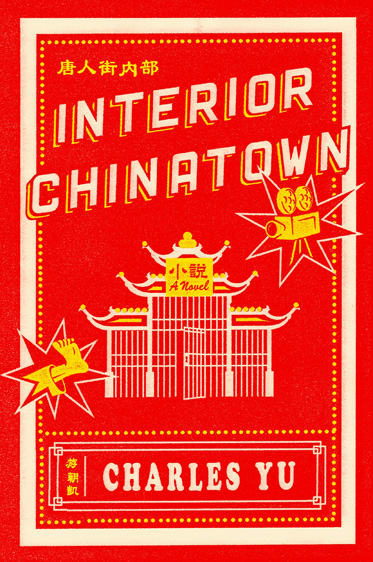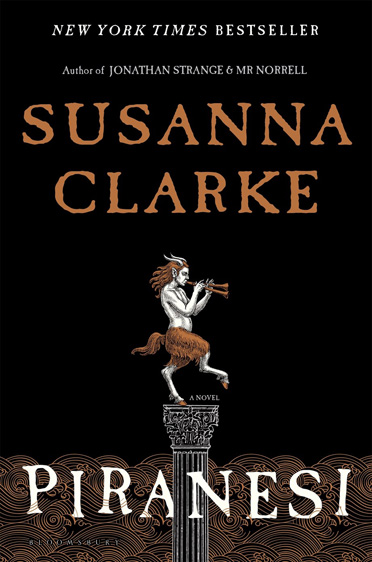-
March 29, 2021
Zombie Round
-
Charles Yu
2Interior Chinatown
v.
Z1PiranesiSusanna Clarke
-
Judged by
Ingrid Rojas Contreras
Like possibly many of you, I lost my ability to read for pleasure some months into the pandemic. It was hard to live without reading. I opened a book and read the same sentence over and over again, forcing myself to pause over punctuation choices, each word, finally each serif, until finally I gave in to the craving to refresh my news sources and see if the last institutions safeguarding our already vulnerable populations had been torched or had burnt down to the ground. I agreed to read for the Tournament of Books at a time when I wasn’t sure if I’d ever read anything for pleasure again. I regained my ability to read maybe in the same month (if not some two weeks ahead) of receiving copies for these two contenders. Instead of the planned disciplinary tortures I had imagined for myself, I simply fell into a couch and read! And! Passed! The! Pages! While! Continuing! To! Read!
Piranesi by Susanna Clarke is 245 pages. Can you believe I read that many pages in two sittings? Me neither. The novel is tenebrous, stark, mysterious. It tells of a labyrinthine expanse, a different world, that can be accessed from this world through a set of secret instructions. Large halls go on for infinity. At the door between the 5th and 4th North-Western Hall a marbled faun holds one finger to his lips, and in the 192nd Western Hall there is a window framing the moon, and a crowd of statues looking up at it. The feeling I got from the book was that of walking in a quiet and very beautiful garden. The narrator of the story is detained in these Halls. He doesn’t remember arriving there, but the work of mapping what he calls the House and its many wonders is one he approaches with joy. There is also the Other, a man who appears every once in a while staring with attention at a glowing screen, who has a seemingly endless supply of new clothes. How are these two occupants of the House related? What is the House? It is a story we unravel slowly. Reading Piranesi felt like being detained in a time outside of time. The writing about the House is simply arresting. In the Drowned Halls, “the Waters are shallow, tranquil, and covered in water lilies, but in the centre they are deep and treacherous, full of broken Masonry and drowned Statues…” Here the statues are “clothed in rags or armored with encrustations of shellfish.” The language made me hang at times, stagger over its beauty. Other times it was direct, oblong.
Interior Chinatown by Charles Yu is 266 pages—which I consumed in a continuous and massively absorbed manner. It’s almost like I reinvented reading, I did it with such abandon. Interior Chinatown is typed out like a television script. The font is Courier New, the dialogue is centered on the page, and stage directions fill in the scenes. The stage where the story takes place is Interior Chinatown and the character we follow beginning to end is Generic Asian Man. I didn’t say main character because only white characters, who are saviors swooping into Chinatown, are main characters. Or that’s the conceit. The format is the cleverest commentary I have ever seen about racism in Hollywood and in publishing—about which stories are monetized, who gets to be front and center, who is allowed a main story arc, and in the case of minorities, what kind of story arcs are allowed. The opening pages are breathtaking. They include a resume for Willis Wu, “(Asian) Actor.” Under skills there are the following items listed: “Kung Fu (Moderate Proficiency), Fluent in Accented English, Able to do Face of Great Shame on command.” The satire of racist tropes is so precise as to both be a riot and painful to behold. Under a list dedicated to the roles Willis Wu’s mother has played it reads:
Pretty Oriental Flower
Asiatic Seductress
Young Dragon Lady
Slightly Less Young Dragon Lady
Restaurant Hostess
There’s a full range of Note Books and related stationery products at fieldnotesbrand.com. Field Notes is proud to once again be a sponsor of the Tournament of Books.
You get the gist—searing, and a riot. And still! The script format breaks. Whenever the fourth wall is broken—whenever the text addresses the audience or the characters make a reference to the absurd confines of their fictionality, we enter the world of the novel. We see prose blocks and indents, and dialogue in quotes. We see a family struggling to make of themselves something more out of the limited set of opportunities before them, and we see a marriage breaking apart. “The reality being that they’d lost the plot somewhere along the way, their once great romance spun into a period piece, into an immigrant family story, and then into a story about two people trying to get by.”
Interior Chinatown uses the language of scripts and their stage directions to render visible what would otherwise remain implicit, the limits placed on Asian American communities, but more. The book uses the screenplay as a treatise through which to excavate Asian American history, oppression, lineages of loss, poverty, and oppression. Interior Chinatown is many things at once, each dissolving into the next. Reading it is like watching an eternally morphing set.
How to choose between such starkly different books? One is an otherworldly experience, the other is the realness of an experience achieved through farce. In thinking about what possible parameters I could come up to judge between these two books, I considered the metric of reading with abandon. Which novel had kept me the most enthralled? Piranesi sated me with its elegance. Interior Chinatown held me in intellectual hypnosis. Unable to come to an answer, I opened random pages and compared the language. “The Hall where I usually sleep—the Third Northern Hall—is full of birds and at night I hear the little sounds as they shift and flutter on their perches; but as far as I could tell there were no birds in the One-Hundred-and-Ninety-Second Western Hall,” read Piranesi. “Chinaman, [is] the [epithet] that seems, in a way, the most harmless, being that in a sense it is literally just a descriptor. China. Man. And yet in that simplicity, in the breadth of its use, it encapsulates so much, This is what you are. Always will be, to me, to us. Not one of us. This other thing.” I could not, in fact, compare the language by choosing random passages, but I did find an answer as to which book I might advance. While Piranesi had allowed me passage into a magical realm with its own set of problems, Interior Chinatown had taken me to a farcical place and delivered me whole back to this world, where the satisfaction of seeing stereotypes named, dissected, and gleefully set on fire were sorely, sorely needed—and welcome with open arms.
Match Commentary
By Colleen Callery & Andrew Womack
Andrew Womack: We’re here today with Colleen Callery from one of our favorite Brooklyn bookstores, Books Are Magic. Colleen, how are you doing and how are you holding up in these strange times?
Colleen Callery: Hi, Andrew! I’m writing from my desk in Brooklyn as my cats nap in the sun on my bed. It’s a nice spot, to be sure, but I miss the bookstore a lot. I’ve been working from home for almost a year now. While Books Are Magic is lovely and lively, our office space is tiny, really just a glorified tree house with low ceilings and little ventilation, so it hasn’t been an ideal workspace while trying to maintain distance during a pandemic.
Andrew: Can you give our readers who haven’t visited Books Are Magic a sense of the magic?
Colleen: The store itself has lots of natural light, room to browse, and, in the before times, was filled with customers, kids reading sprawled across bean bags and stools, slobbery dogs excited for treats, upbeat music filling my brain with earworms (to which I am supremely susceptible). Those things are still there, of course, but in smaller quantities, and I don’t get to be around them nearly as much.
Andrew: And where do you fit into the Books Are Magic staff/coven?
Colleen: I am the marketing director, so most of my job is online anyway— sending newsletters, posting on social media, managing our online content, coordinating campaigns and partnerships, etc. Since the pandemic we have a few “office” people who have remained mostly working from home, but it has been a struggle to keep up with the daily store goings-on and feel like I’m accurately conveying our space to the outside world. Luckily, I have a wonderful team and a teammate who has taken over most of the photo duties for social media, which is a huge help. And hopefully once I’m vaccinated I’ll be able to join the in-store team more regularly again.
Andrew: Here’s to speedy—but smart—returns! So let’s get to today’s judgment: Were you persuaded by Judge Rojas Contreras’s decision today?
Colleen: I really feel for Ingrid, these books both sound so good! Interior Chinatown has been on our bestseller list for months, and Piranesi is still selling like hotcakes from our front table. Plus, I have coworkers that love both of them, so I know they are both really good, even without having read them yet.
I definitely understand the pull of fantasy, especially one as beautiful as Piranesi. Those sentences! That imagery! A whole new world to inhabit, which, I mean, it’s the true gift of storytelling. It may be why I’m reading through classic sci-fi so quickly these days. But Ingrid’s praise for Interior Chinatown sings of something that resonated even deeper with our current world. So, I have to say that I was convinced. And now I’m thinking I need to pick up Interior Chinatown myself.
Andrew: This year’s Tournament was the first where I started reading one of the books—in this case, Interior Chinatown—based on how it’s fared during the event. So far the book is absolutely enthralling, and the effectiveness of its format that Judge Rojas Contreras mentions really must be read to be believed. I can’t speak for Piranesi, but as for Interior Chinatown: I’m very excited to see it head to this week’s championship match.
So all in all, I’m just saying—yes, read it! Have you had any favorite books from the past year?
Colleen: Awesome, I can’t wait! I, like Ingrid, stopped reading for most of 2020. It was horrible. I couldn’t concentrate at all. But by the grace of some reading goddess, the book(s) that broke my slump were Octavia Butler’s Parable of the Sower and Parable of the Talents. I read them both on my phone through the Libby app and felt reborn. Since then I’ve been reading lots of backlist sci-fi that I’ve always wanted to read, and newer books that tend to have a touch of magical realism, spiritualism, and/or science to them.
Andrew: Wonderful! Any recommendations?
Colleen: Always! The books I can’t stop thinking about lately are: Conjure Women by Afia Atakora, set on a plantation during the Civil War, about a midwife/healer to the enslaved community and her daughter, who has a sort of fated relationship with the daughter of the plantation owners. Godshot by Chelsea Bieker, highly recommended for those who are obsessed with documentaries about cults (me); this is fiction, but was wholly consuming. Thin Places by Jordan Kisner is so good. I didn’t pick it up for a while because I didn’t really understand what it meant to “explore places of in-betweenness,” but it was my loss because these essays are incredible. And I have a few chapters left in Entangled Life by Merlin Sheldrake, but I’m obsessed with mycology and how wild mushrooms and fungus are. Sheldrake is also just a fascinating, genius human all together.
Andrew: My interest is definitely piqued after watching this video of someone growing a batch of oyster mushrooms inside a copy of Entangled Life. So can you tell us, with all this that’s been going on, how the months look for the Books Are Magic community?
Colleen: As a store, I think we’re definitely more aware of our presence in the book ecosystem after 2020, and I can see us continuing more partnerships we started last year—event partnerships, sales partnerships, etc.—in the future. I think we are feeling really optimistic at Books Are Magic. We’ve been able to maintain a really strong events program online, and are brainstorming about how that will continue to evolve, and have maintained strong sales this year despite all its uncertainties. And with the arrival of vaccines and warmer weather, the store feels poised for a really good summer.
Andrew: That’s wonderful news. Thank you for joining us today, Colleen! Best wishes to you and Books Are Magic!
Colleen: Thank you so much for inviting me, Andrew! Can’t wait to find out the winner :)
New 2021 Tournament of Books merch is now available at the TMN Store. As a reminder, Sustaining Members receive 50 percent off everything in our store. To find out why we’re asking for your support and how you can become a Sustaining Member, please visit our Membership page. Thank you.
Welcome to the Commentariat
Population: You
To keep our comments section as inclusive as possible for the book-loving public, please follow the guidelines below. We reserve the right to delete inappropriate or abusive comments, such as ad hominem attacks. We ban users who repeatedly post inappropriate comments.
- Criticize ideas, not people. Divisiveness can be a result of debates over things we truly care about; err on the side of being generous. Let’s talk and debate and gnash our book-chewing teeth with love and respect for the Rooster community, judges, authors, commentators, and commenters alike.
- If you’re uninterested in a line of discussion from an individual user, you can privately block them within Disqus to hide their comments (though they’ll still see your posts).
- While it’s not required, you can use the Disqus <spoiler> tag to hide book details that may spoil the reading experience for others, e.g., “<spoiler>Dumbledore dies.<spoiler>”
- We all feel passionately about fiction, but “you’re an idiot if you loved/hated this book that I hated/loved” isn't an argument—it’s just rude. Take a breath.




